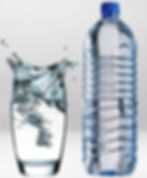Do you ever worry that your loved one with dementia is dehydrated? Have you ever asked your loved one's doctor about your concerns with dehydration?

This blog post will discuss why older adults with dementia experience dehydration and how you can help.
Approximately 60% of our bodies contain water. The water in our bodies helps regulate temperature carries oxygen and nutrients to our organs, like the brain. Water also helps eliminate waste and toxins from our bodies.
Now before you begin reading, this is about dehydration and dementia. The older adult who may only have a few sips of water a day. This post does not apply to an older adult who drinks adequate amounts of water.
Older people, in general, are at higher risk for dehydration due to the changes that occur with aging. Our bodies produce a hormone that tells the kidneys how much water we need. This hormone is called antidiuretic hormone, and older adults make less of it. The kidney also changes with age and is less efficient in conserving water. Other physical changes can make it more difficult to store water.
An older person with dementia is at even higher risk for dehydration because they may not communicate their needs or recognize that they need to drink water to prevent dehydration. As dementia progresses, dehydration is even a more challenging problem.
The general recommendation for a healthy adult is to drink about 6-8 glasses of water daily. Getting your loved one to drink that much water can be very difficult. I often start by asking caregivers to try and see exactly how much water their loved one is drinking first. This way, they can understand how deficient their loved one may be. This strategy alone can help the caregiver recognize to give their loved one more water which can improve the problem. People usually overestimate how much water their loved one is drinking.
Then I give the following recommendations:
Don't ask your loved ones if they are thirsty; offer them a drink.
If your loved one likes water, fill a couple of 16 oz bottles with water and make sure they sip and drink those throughout the day in addition to anything else they may drink or eat.
If a loved one doesn't like water, make sure to provide a variety of fluids or flavor the water by squeezing some lemon in it. Also, experiment with different beverages like iced tea, smoothies, and milkshakes.
Avoid caffeinated drinks, but if a person loves coffee, you can give one cup of decaffeinated coffee daily.
Remind your loved one with visual aids.
Ensure water and other liquids are easy to access, especially if your loved one has mobility issues.
Add foods with higher water content, such as fruit, yogurt, or jello.
Schedule bathroom breaks to prevent accidents. If your loved one has mild to moderate dementia, they may worry about not making it to the toilet in time and avoid adequate water intake.
